Critical Analysis: Oral Language and Literacy Learning in Early Years
VerifiedAdded on 2022/12/16
|6
|1067
|84
Report
AI Summary
This report critically discusses theories of oral language development, including psycholinguistic and sociocultural theories, highlighting their perspectives on language acquisition. It then analyzes the benefits and limitations of using technology, such as mobile phones and electronic games, in oral language learning, addressing both engagement and potential drawbacks like addiction and impaired learning. Finally, the report explores multimodal resources for language development in out-of-school environments, emphasizing the use of games, storytelling, recreational activities, and homonyms to foster literacy learning and enhance communication skills in young children. The report provides a comprehensive overview of language development strategies and resources suitable for early childhood education.
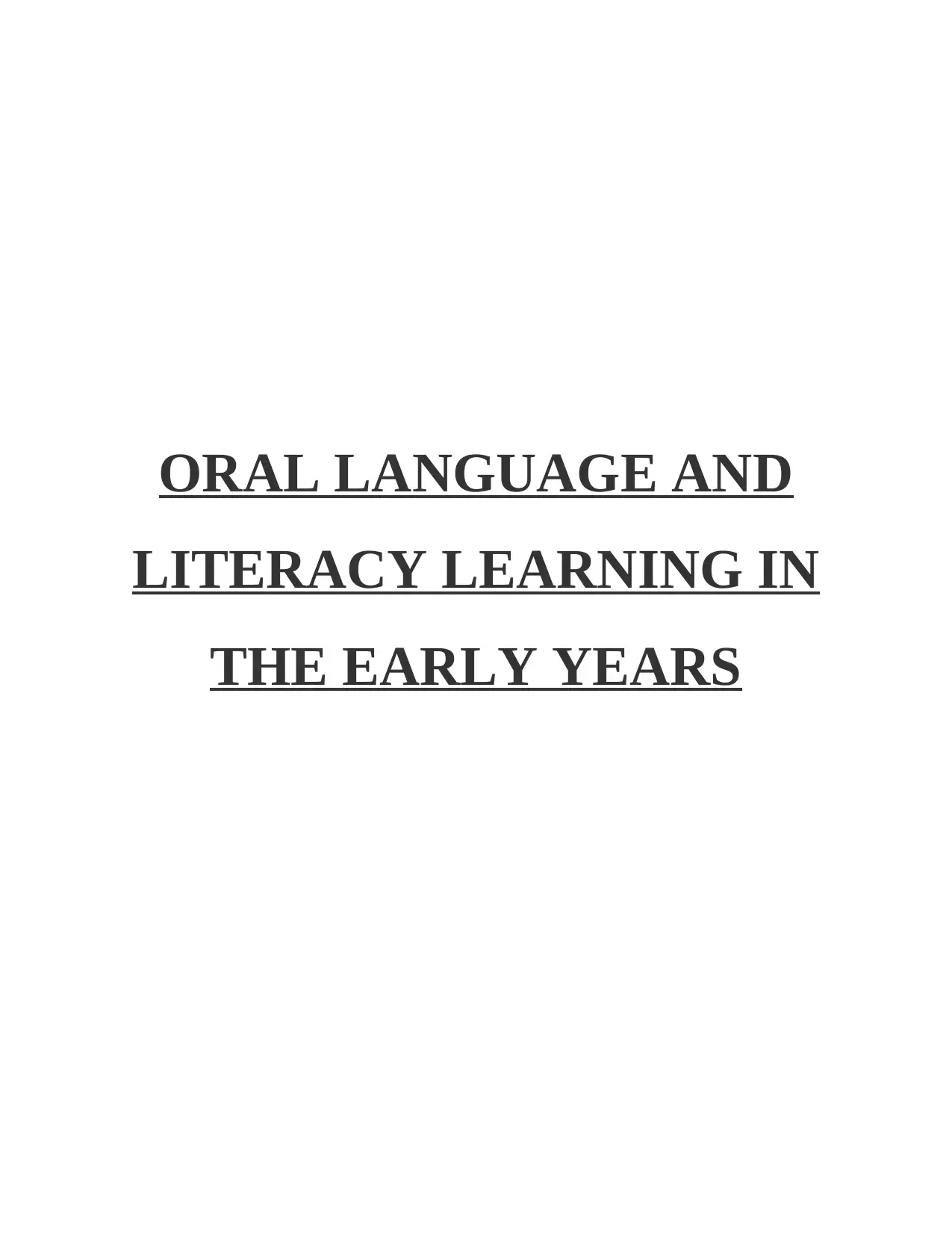
ORAL LANGUAGE AND
LITERACY LEARNING IN
THE EARLY YEARS
LITERACY LEARNING IN
THE EARLY YEARS
Paraphrase This Document
Need a fresh take? Get an instant paraphrase of this document with our AI Paraphraser
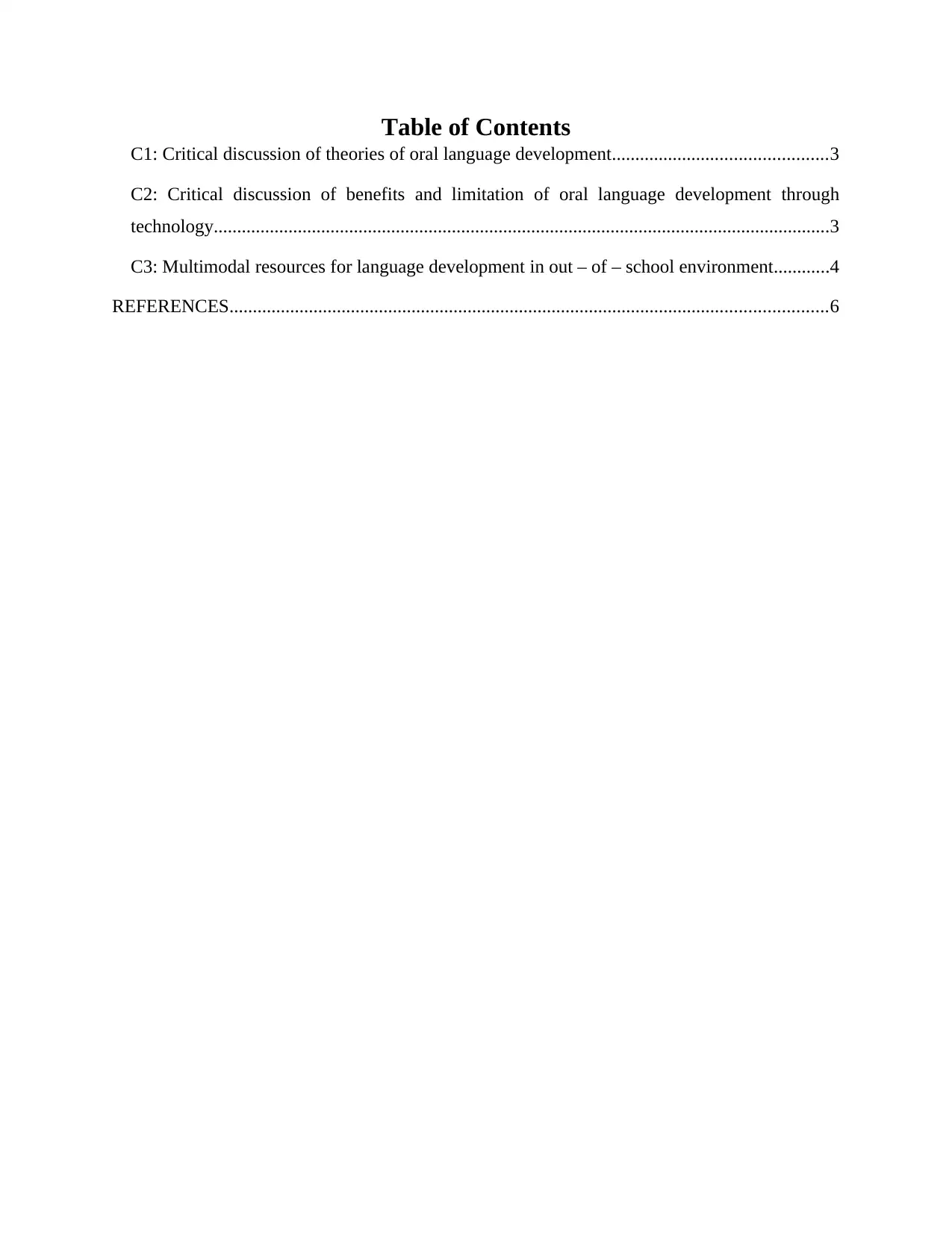
Table of Contents
C1: Critical discussion of theories of oral language development..............................................3
C2: Critical discussion of benefits and limitation of oral language development through
technology....................................................................................................................................3
C3: Multimodal resources for language development in out – of – school environment............4
REFERENCES................................................................................................................................6
C1: Critical discussion of theories of oral language development..............................................3
C2: Critical discussion of benefits and limitation of oral language development through
technology....................................................................................................................................3
C3: Multimodal resources for language development in out – of – school environment............4
REFERENCES................................................................................................................................6
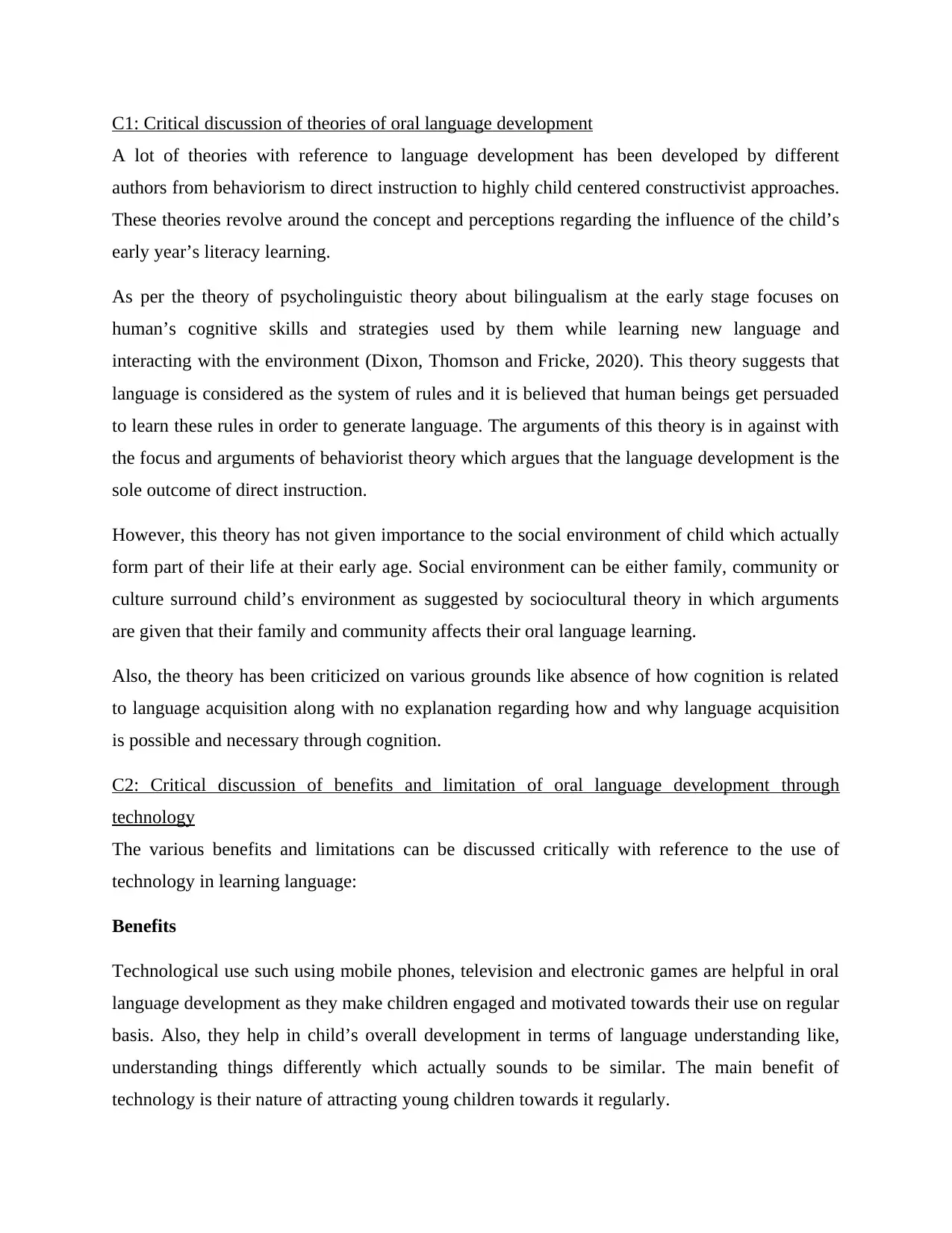
C1: Critical discussion of theories of oral language development
A lot of theories with reference to language development has been developed by different
authors from behaviorism to direct instruction to highly child centered constructivist approaches.
These theories revolve around the concept and perceptions regarding the influence of the child’s
early year’s literacy learning.
As per the theory of psycholinguistic theory about bilingualism at the early stage focuses on
human’s cognitive skills and strategies used by them while learning new language and
interacting with the environment (Dixon, Thomson and Fricke, 2020). This theory suggests that
language is considered as the system of rules and it is believed that human beings get persuaded
to learn these rules in order to generate language. The arguments of this theory is in against with
the focus and arguments of behaviorist theory which argues that the language development is the
sole outcome of direct instruction.
However, this theory has not given importance to the social environment of child which actually
form part of their life at their early age. Social environment can be either family, community or
culture surround child’s environment as suggested by sociocultural theory in which arguments
are given that their family and community affects their oral language learning.
Also, the theory has been criticized on various grounds like absence of how cognition is related
to language acquisition along with no explanation regarding how and why language acquisition
is possible and necessary through cognition.
C2: Critical discussion of benefits and limitation of oral language development through
technology
The various benefits and limitations can be discussed critically with reference to the use of
technology in learning language:
Benefits
Technological use such using mobile phones, television and electronic games are helpful in oral
language development as they make children engaged and motivated towards their use on regular
basis. Also, they help in child’s overall development in terms of language understanding like,
understanding things differently which actually sounds to be similar. The main benefit of
technology is their nature of attracting young children towards it regularly.
A lot of theories with reference to language development has been developed by different
authors from behaviorism to direct instruction to highly child centered constructivist approaches.
These theories revolve around the concept and perceptions regarding the influence of the child’s
early year’s literacy learning.
As per the theory of psycholinguistic theory about bilingualism at the early stage focuses on
human’s cognitive skills and strategies used by them while learning new language and
interacting with the environment (Dixon, Thomson and Fricke, 2020). This theory suggests that
language is considered as the system of rules and it is believed that human beings get persuaded
to learn these rules in order to generate language. The arguments of this theory is in against with
the focus and arguments of behaviorist theory which argues that the language development is the
sole outcome of direct instruction.
However, this theory has not given importance to the social environment of child which actually
form part of their life at their early age. Social environment can be either family, community or
culture surround child’s environment as suggested by sociocultural theory in which arguments
are given that their family and community affects their oral language learning.
Also, the theory has been criticized on various grounds like absence of how cognition is related
to language acquisition along with no explanation regarding how and why language acquisition
is possible and necessary through cognition.
C2: Critical discussion of benefits and limitation of oral language development through
technology
The various benefits and limitations can be discussed critically with reference to the use of
technology in learning language:
Benefits
Technological use such using mobile phones, television and electronic games are helpful in oral
language development as they make children engaged and motivated towards their use on regular
basis. Also, they help in child’s overall development in terms of language understanding like,
understanding things differently which actually sounds to be similar. The main benefit of
technology is their nature of attracting young children towards it regularly.
⊘ This is a preview!⊘
Do you want full access?
Subscribe today to unlock all pages.

Trusted by 1+ million students worldwide
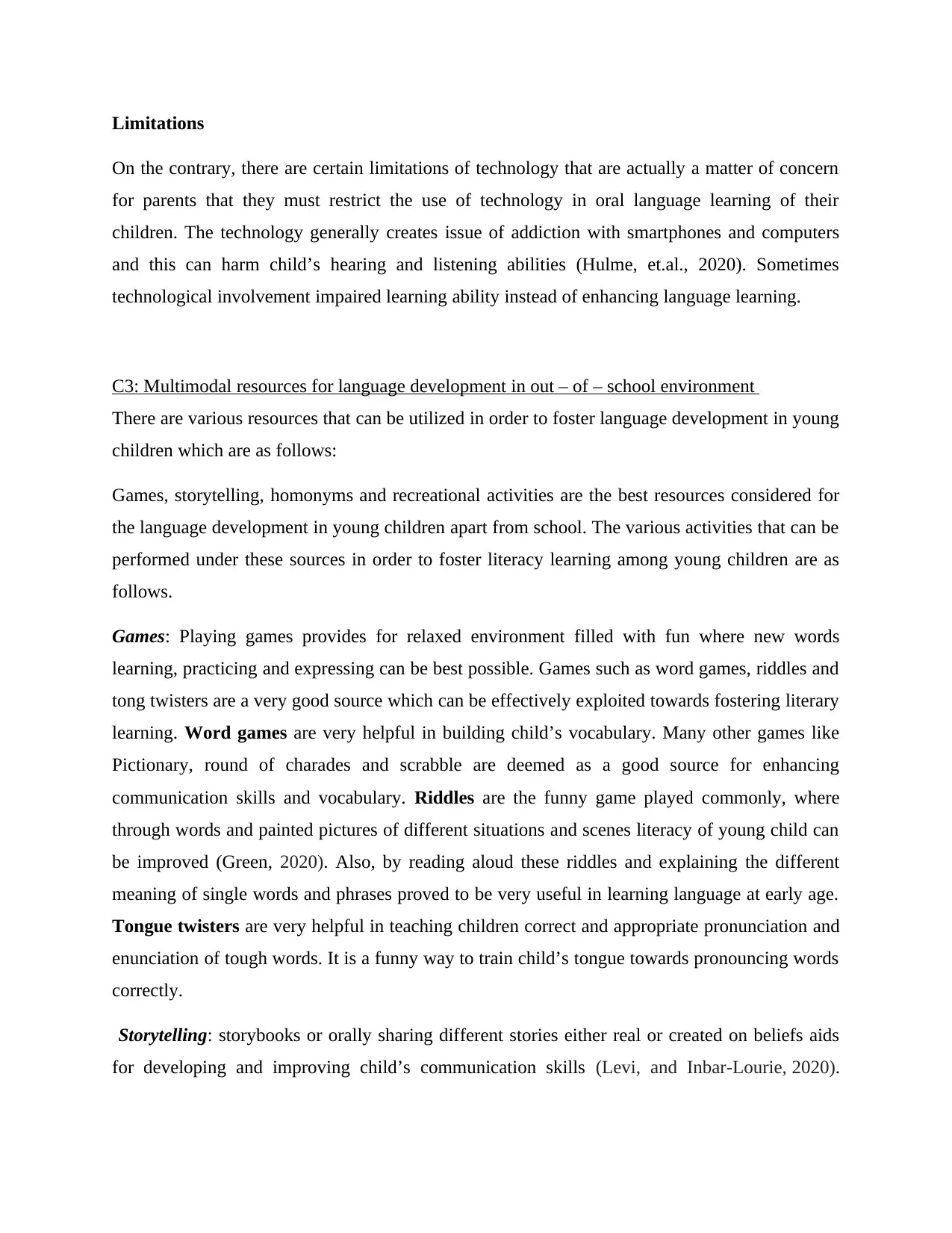
Limitations
On the contrary, there are certain limitations of technology that are actually a matter of concern
for parents that they must restrict the use of technology in oral language learning of their
children. The technology generally creates issue of addiction with smartphones and computers
and this can harm child’s hearing and listening abilities (Hulme, et.al., 2020). Sometimes
technological involvement impaired learning ability instead of enhancing language learning.
C3: Multimodal resources for language development in out – of – school environment
There are various resources that can be utilized in order to foster language development in young
children which are as follows:
Games, storytelling, homonyms and recreational activities are the best resources considered for
the language development in young children apart from school. The various activities that can be
performed under these sources in order to foster literacy learning among young children are as
follows.
Games: Playing games provides for relaxed environment filled with fun where new words
learning, practicing and expressing can be best possible. Games such as word games, riddles and
tong twisters are a very good source which can be effectively exploited towards fostering literary
learning. Word games are very helpful in building child’s vocabulary. Many other games like
Pictionary, round of charades and scrabble are deemed as a good source for enhancing
communication skills and vocabulary. Riddles are the funny game played commonly, where
through words and painted pictures of different situations and scenes literacy of young child can
be improved (Green, 2020). Also, by reading aloud these riddles and explaining the different
meaning of single words and phrases proved to be very useful in learning language at early age.
Tongue twisters are very helpful in teaching children correct and appropriate pronunciation and
enunciation of tough words. It is a funny way to train child’s tongue towards pronouncing words
correctly.
Storytelling: storybooks or orally sharing different stories either real or created on beliefs aids
for developing and improving child’s communication skills (Levi, and Inbar-Lourie, 2020).
On the contrary, there are certain limitations of technology that are actually a matter of concern
for parents that they must restrict the use of technology in oral language learning of their
children. The technology generally creates issue of addiction with smartphones and computers
and this can harm child’s hearing and listening abilities (Hulme, et.al., 2020). Sometimes
technological involvement impaired learning ability instead of enhancing language learning.
C3: Multimodal resources for language development in out – of – school environment
There are various resources that can be utilized in order to foster language development in young
children which are as follows:
Games, storytelling, homonyms and recreational activities are the best resources considered for
the language development in young children apart from school. The various activities that can be
performed under these sources in order to foster literacy learning among young children are as
follows.
Games: Playing games provides for relaxed environment filled with fun where new words
learning, practicing and expressing can be best possible. Games such as word games, riddles and
tong twisters are a very good source which can be effectively exploited towards fostering literary
learning. Word games are very helpful in building child’s vocabulary. Many other games like
Pictionary, round of charades and scrabble are deemed as a good source for enhancing
communication skills and vocabulary. Riddles are the funny game played commonly, where
through words and painted pictures of different situations and scenes literacy of young child can
be improved (Green, 2020). Also, by reading aloud these riddles and explaining the different
meaning of single words and phrases proved to be very useful in learning language at early age.
Tongue twisters are very helpful in teaching children correct and appropriate pronunciation and
enunciation of tough words. It is a funny way to train child’s tongue towards pronouncing words
correctly.
Storytelling: storybooks or orally sharing different stories either real or created on beliefs aids
for developing and improving child’s communication skills (Levi, and Inbar-Lourie, 2020).
Paraphrase This Document
Need a fresh take? Get an instant paraphrase of this document with our AI Paraphraser
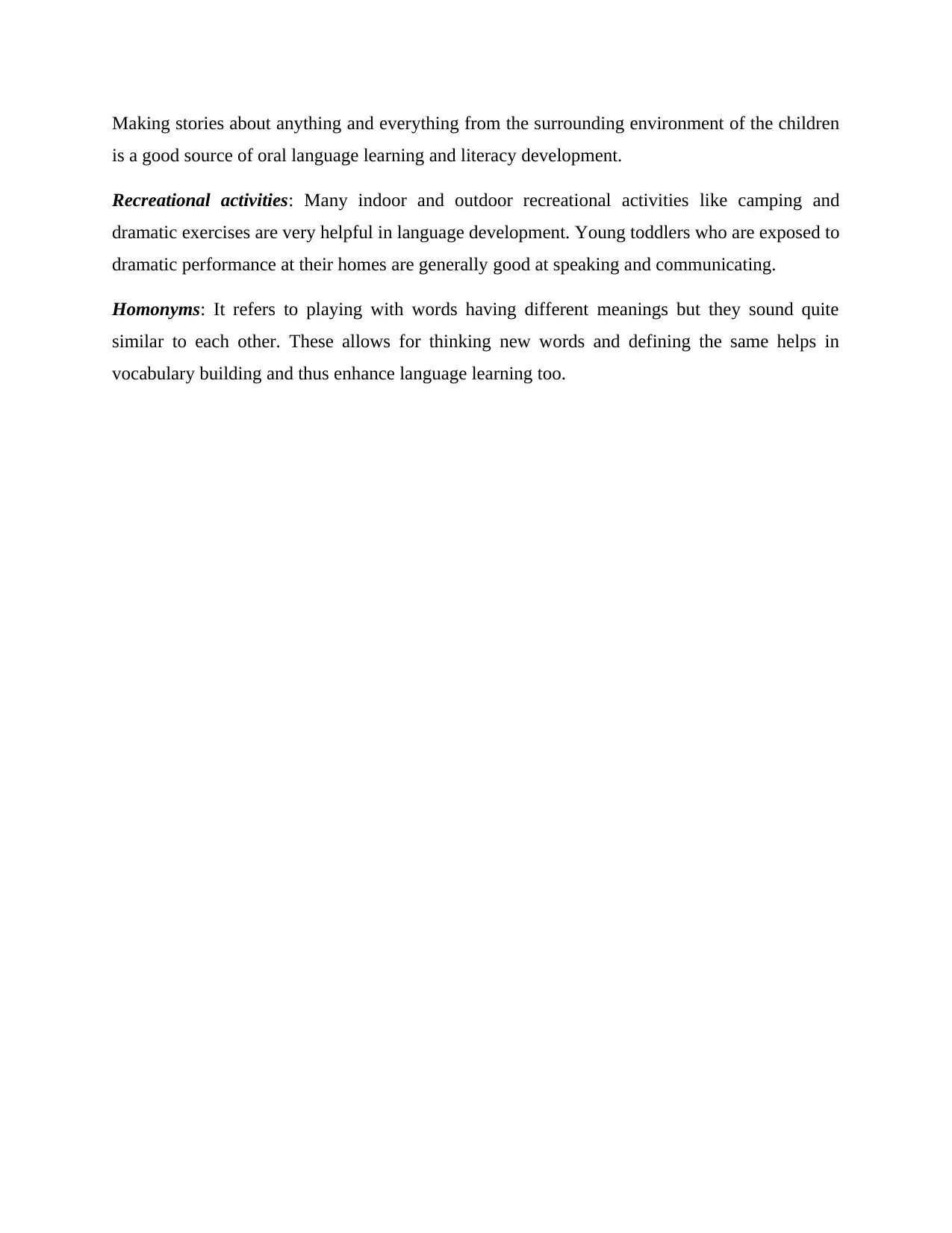
Making stories about anything and everything from the surrounding environment of the children
is a good source of oral language learning and literacy development.
Recreational activities: Many indoor and outdoor recreational activities like camping and
dramatic exercises are very helpful in language development. Young toddlers who are exposed to
dramatic performance at their homes are generally good at speaking and communicating.
Homonyms: It refers to playing with words having different meanings but they sound quite
similar to each other. These allows for thinking new words and defining the same helps in
vocabulary building and thus enhance language learning too.
is a good source of oral language learning and literacy development.
Recreational activities: Many indoor and outdoor recreational activities like camping and
dramatic exercises are very helpful in language development. Young toddlers who are exposed to
dramatic performance at their homes are generally good at speaking and communicating.
Homonyms: It refers to playing with words having different meanings but they sound quite
similar to each other. These allows for thinking new words and defining the same helps in
vocabulary building and thus enhance language learning too.
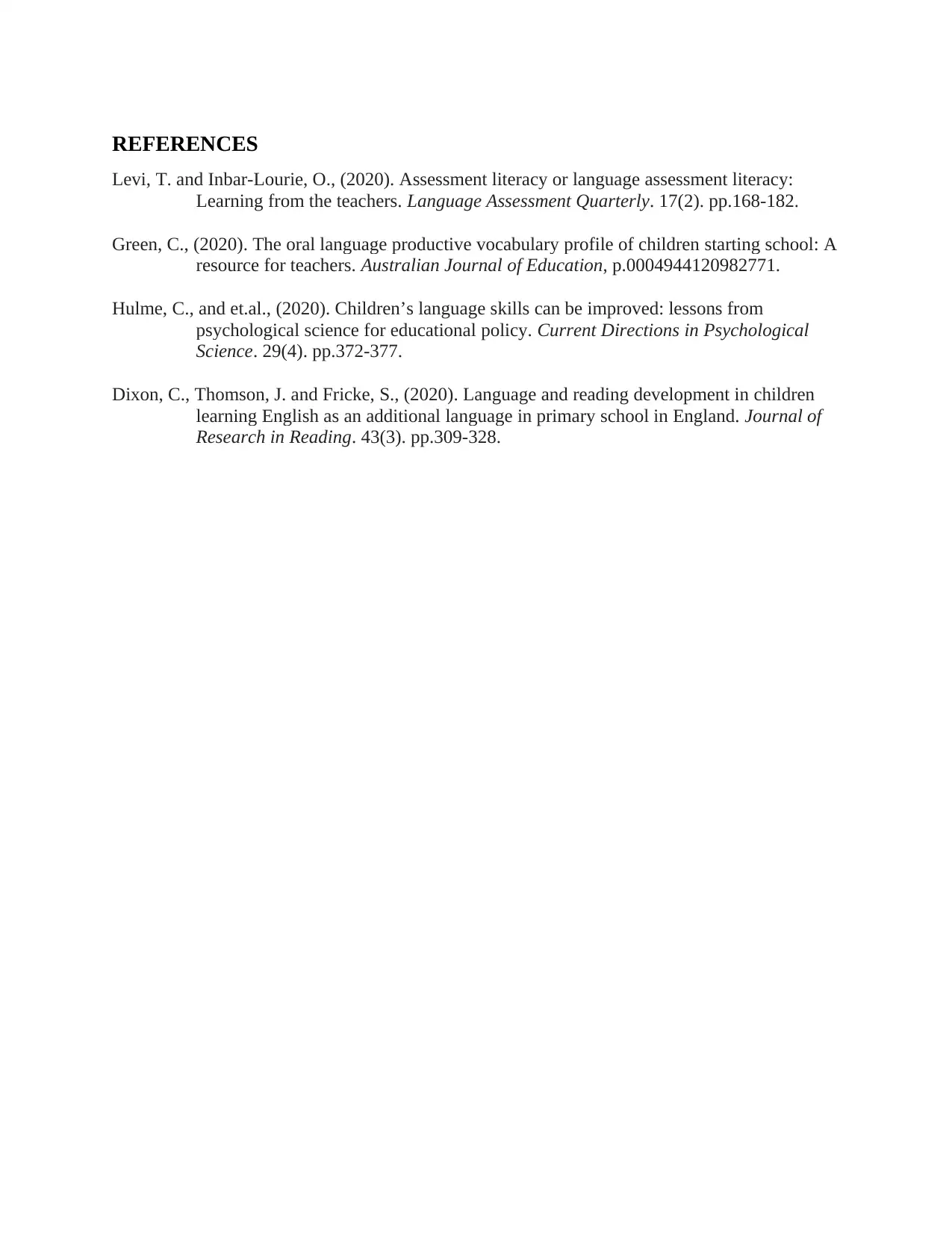
REFERENCES
Levi, T. and Inbar-Lourie, O., (2020). Assessment literacy or language assessment literacy:
Learning from the teachers. Language Assessment Quarterly. 17(2). pp.168-182.
Green, C., (2020). The oral language productive vocabulary profile of children starting school: A
resource for teachers. Australian Journal of Education, p.0004944120982771.
Hulme, C., and et.al., (2020). Children’s language skills can be improved: lessons from
psychological science for educational policy. Current Directions in Psychological
Science. 29(4). pp.372-377.
Dixon, C., Thomson, J. and Fricke, S., (2020). Language and reading development in children
learning English as an additional language in primary school in England. Journal of
Research in Reading. 43(3). pp.309-328.
Levi, T. and Inbar-Lourie, O., (2020). Assessment literacy or language assessment literacy:
Learning from the teachers. Language Assessment Quarterly. 17(2). pp.168-182.
Green, C., (2020). The oral language productive vocabulary profile of children starting school: A
resource for teachers. Australian Journal of Education, p.0004944120982771.
Hulme, C., and et.al., (2020). Children’s language skills can be improved: lessons from
psychological science for educational policy. Current Directions in Psychological
Science. 29(4). pp.372-377.
Dixon, C., Thomson, J. and Fricke, S., (2020). Language and reading development in children
learning English as an additional language in primary school in England. Journal of
Research in Reading. 43(3). pp.309-328.
⊘ This is a preview!⊘
Do you want full access?
Subscribe today to unlock all pages.

Trusted by 1+ million students worldwide
1 out of 6
Related Documents
Your All-in-One AI-Powered Toolkit for Academic Success.
+13062052269
info@desklib.com
Available 24*7 on WhatsApp / Email
![[object Object]](/_next/static/media/star-bottom.7253800d.svg)
Unlock your academic potential
Copyright © 2020–2026 A2Z Services. All Rights Reserved. Developed and managed by ZUCOL.





